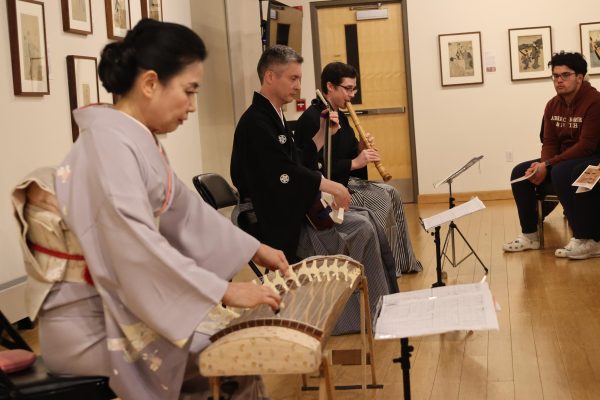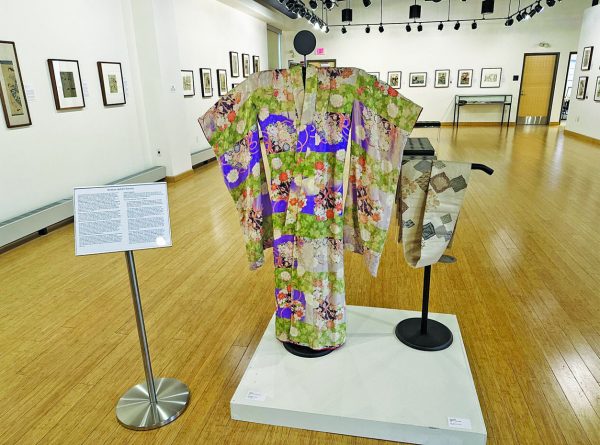Black Student Wants Minority Voices To Be Heard
December 14, 2020
It was a chilly fall Saturday, not so cold that he needed to pull out his heavy coat yet but just enough that each of his breaths was visible as he exhaled.
That day marked the third game of the 2017 season and the Cougars were playing their top rivals, the Wilkes University Colonels. His team had yet to earn any wins, which only added another layer of anxiety to his nervous mind.
The cold, the chills, the noise that seemed to be coming from every angle – everything made him disconnect from the moment. But even as he tried to pull himself back in, a sweeping glance across the stands reminded him he really wasn’t part of that moment: No one seated there looked like him.
Tavion Rogers, senior government, law and national security and philosophy double major, said this loneliness is his everyday reality as a Black student.
“It can definitely be a difficult experience, especially when you’re an underclassman trying to adapt to a new environment. There have been many instances where being a minority has resulted in a feeling of isolation, as it sometimes feels like people wouldn’t care about the issues that only impact a small percentage of students,” he said.
He believes microaggressions—those small and often unintentional moments when someone says or does something subtly offensive to a person from a marginalized group—are one of the biggest issues minority students on campus experience.
Rogers remembers times when, for example, a culturally insensitive comment was made in class and he felt like he couldn’t speak up about it.
“I was not convinced that there would be any efforts to make a change if I spoke up. I feel as though many Black students on campus feel the same way, and some may end up just being silent because of it,” Rogers said.
According to the National Center for Education Statistics, the total enrollment of young adults in colleges, universities and other degree-granting institutions has increased across all racial groups, with a 5% increase for Black students in 2016.
Hana Omiya, Project Coordinator for the Office of Diversity, Inclusion, and Belonging [DEIB] at Harvard University, said it is important for more universities, both public and private, to work to increase diversity numbers because they reflect future leaders.
“Our team’s big goals are to seek and enhance applied research surrounding DEIB work so that no one can question why diversity is important,” she said.
Amy Lahart, Vice President of Mission Integration at Misericordia, said diversity is “significantly important to the educational experience.” She said diversity within a college community is critical in preparing students for life after graduation.
“Our future customers, clients, patients, students, neighbors, and communities are dependent on college/university communities prioritizing diversity, equity and inclusion initiatives on their campuses,” Lahart said.
For Rogers, the value of having racial diversity lies in exposing others to the different perspectives people of color can offer.
“One of the most important aspects of a university setting is that people can be exposed to different ideas and perspectives from varying backgrounds. Having a diverse student body, faculty, and staff, allows for unique viewpoints to be shared all throughout campus,” Rogers said.
He said he chose Misericordia because he felt he could build better relationships with faculty at a smaller school. One of his concerns, though, was the lack of diversity.
As of 2020, 12% of students enrolled at the university identify with minority racial groups, a 3% increase from 2016, but still something Rogers said can have a major impact on the way students bond with one another.
“For me, it was a matter of comfort as I felt like it may be difficult to find other students who I could relate to and build relationships with,” he said.
Lahart said she and a team of other staff and faculty have been working hard over recent years to change this experience for students like Rogers. She is a part of a multidisciplinary team dedicated to DEIB initiatives who have been working with departments across campus to “attract and retain” a more diverse student body.
“I hope to work on creating on-campus visible images and symbolism and webpage resources to illustrate and communicate how we celebrate our diversity and that we are a community that embraces and honors our differences,” she said.
Lahart said the team plans to work both externally and internally to achieve this by hosting programs such as “Conversations That Matter,” which is set to begin in the spring 2021 semester, forming a Campus Climate Response Team and closely examining staff positions to support DEIB initiatives.
She said another key part of this process is collaborating with students, faculty and staff from minority groups. She hopes to work with organizations like the Multicultural Club and the newly formed Black Student Union to help amplify minority voices and create a greater sense of unity.
“I am sensitive to what I have learned through the Black Lives Matter movement, and that is that we all must take action for the progression of our DEIB initiatives that strive to end discrimination and racism,” Lahart said.
These efforts are being made as a way to provide better support to minority students, a process that Omiya said will require a “multi-pronged approach.”
“Community engagement is deeply important for campuses to invest in – to hear from students, teachers, postdocs, alumni, and staff directly on what are the most pressing issues and opportunities in their space. I also find that solutions are best identified by the community members,” she said.
Rogers said he believes showing students from minority groups they are truly valued will not only attract more diversity but also help sustain it.
“A really good way to support current and future minority students is to ensure that they can voice any potential concerns. A lot of times it can be hard to bring issues to light when you feel as though nobody is going to listen to them,” he said.
He said timeliness is also an important factor.
“It is crucial to actually acknowledge these issues and attempt to make changes when they arise, rather than simply hearing and ignoring them,” Rogers said.
Lahart said her goal in helping to lead the university’s DEIB initiatives is simple: to do better as an institution.
“I want to work with all of our constituent groups to continue to support our community and be a part of the change. I am passionate about this work and driven by the desire to provide an enriching and positive experience for all of our students,” she said.
Rogers said he is optimistic about the efforts being made to improve the experience of minority students on campus.
“In my experience, the professors and certain staff members have been really helpful,” he said. “Organizations like the Black Student Union hope to improve these issues by making sure minorities can voice any potential concerns.”






